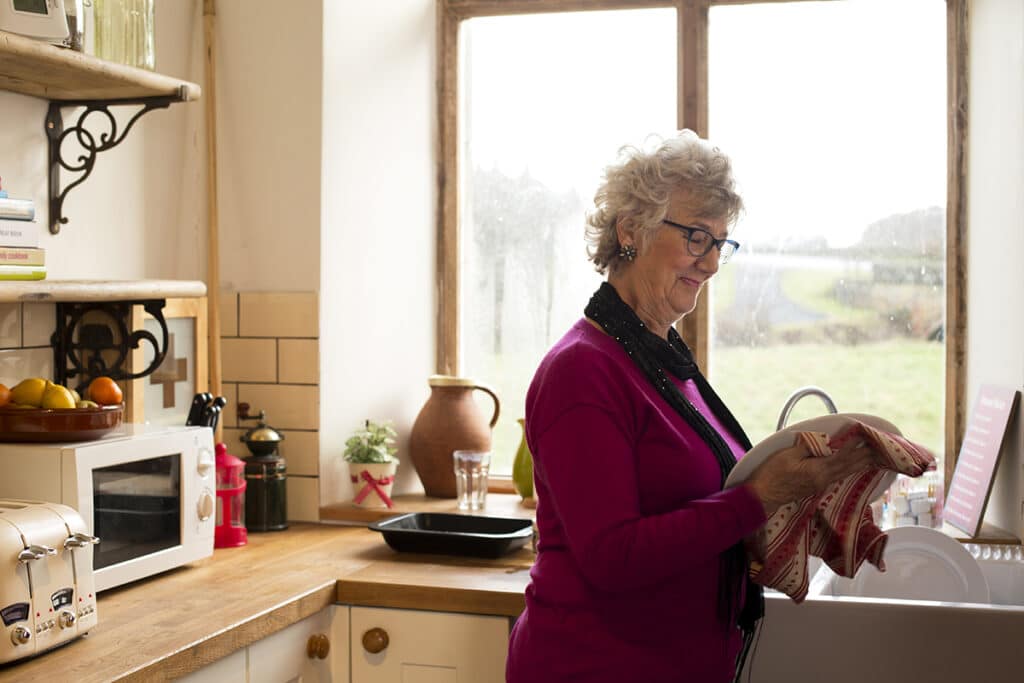Ayuda y apoyo: vivir solo con FTD

When you or someone you love receives an FTD diagnosis, questions and concerns about the possibility of living alone with FTD may surface. Progression and severity of symptoms in the person diagnosed will factor heavily into the decision but living alone in the early stages of FTD may be possible for some.
Retaining this level of independence requires a thorough understanding of symptoms, risks, available supports and community services, as well as a candid and ongoing assessment of the individual person’s strengths and abilities. Determine which activities the person living with FTD can safely accomplish on their own, and which tasks will require outside assistance or support. If possible, consult with occupational, speech, and physical therapy professionals when making these determinations.
Family members, social service agencies, and/or a guardian should be involved in regularly monitoring the situation, so that care transitions can be implemented as needed. For those who may not have local family members or caregivers to help monitor their living situation, case managers from local aging and disability resource centers or private care managers can be called upon to assess evolving care needs over time.
Kathy Lopez of Orange County, California was diagnosed with FTD three years ago, and has been able to continue living independently since that time. Because Kathy does not have family members or close friends nearby to assist with her daily living needs, she has learned to adjust how she lives in order to accommodate the changes that come with her diagnosis.
Creating routines and a detailed list of daily tasks related to finances, appointments, transportation, medication, personal care, and household maintenance can help to make living alone more manageable. Kathy relies on written notes in her calendar and reminders on her smartphone to stay on top of her daily tasks. She also utilizes assistive technology tools, such as her smartwatch and an Alexa-enabled device, to set reminders and alarms for things like cooking, doing laundry, taking medications, and remembering important appointments.
“Whatever reminders that I set on my Alexa appear on my watch. Even if I’m not at home, the reminder still goes off on my watch,” Lopez said.
Scheduling automatic bill payments, hiring a financial advisor, or enlisting the help of a trusted friend to oversee your accounts can be beneficial when it comes to managing finances. Kathy also suggests applying for dementia-specific financial assistance, such as the Subvención de calidad de vida de AFTD Comstock, which has allowed her to keep up with the costs associated with groceries, transportation, and assistive technology.
AFTD maintains a comprehensive list of resources on our website that are helpful for persons diagnosed with FTD, whether they are living independently, with a loved one, or in a care facility. In addition, the following resources can help you determine if, and for how long, you or your loved one are able to live alone, and what supports you will need to do so safely:
Herramientas para determinar una vida segura para alguien con demencia
- Consejos para vivir solo con demencia en etapa temprana (Instituto Nacional sobre el Envejecimiento)
- Recomendaciones de prácticas de atención de la demencia para profesionales que trabajan en el hogar (pdf): Asociación de Alzheimer
Recursos para obtener atención adicional en el hogar
- Localizador de cuidados para personas mayores
- Asociación de cuidado de la vida de envejecimiento
- Buscador de recursos comunitarios
The FTD journey looks different for everyone. Due to the progressive nature of the disease, each person will need to work with their professional and family caregivers to establish a plan for future care. Doing this as early as possible is crucial, as it allows the person living with FTD to participate in choosing how they receive care once they can no longer live alone.
Por categoria
Nuestros boletines
Mantente informado
Regístrese ahora y manténgase al tanto de las últimas novedades con nuestro boletín informativo, alertas de eventos y más...
